I was electrocuted and became an amputee, now I’m presenting the Paralympics
In 2017, Milly Pickles, now 27, was electrocuted in an accident at work. Her injuries caused her to lose her right leg below the knee. She had to learn to walk again with a prosthetic leg and then to run with a blade, a journey she documented on social media. Now a para-athlete and motivational speaker with 240K followers on Instagram, Milly is joining the Channel 4 presenting team for the Paralympics.

In September 2017, whilst doing a work placement as part of my marketing degree, I was involved in an accident where I was electrocuted receiving 36% burns to my body. An electrical current entered my body through my right heel, travelled up my leg and across my pelvis before exiting down my left leg and out of my big toe.
For two weeks I fought for my life in hospital, and also for my legs, which I was told I would lose both of, above the thigh.
So, when I learnt I’d only lose one below the knee, plus two toes on my left foot, me and my whole family were screaming with joy. I was here, leg or no leg, and I was so grateful.
This has been my mindset on the whole of this journey and why, I think, in the seven years since the accident, I have achieved so much.
Life-changing injuries
It was actually me who made the call to get rid of the leg. One morning, all these surgeons came into my hospital room, weighing up the pros and cons of keeping it and I blurted out, "I'm sorry, but I don’t want you to waste your time. I want my leg to be amputated." I was in so much pain. I just knew it had to be done and I have never regretted that decision.
The first thing I said to my parents when they came to visit me in hospital was, 'At least I can train for the Paralympics now.'
The moment everyone left the room, I shed a few tears, but that was it. I was so calm. The first thing I said to my parents when they came to visit was, "At least I can train for the Paralympics now."
I’d always been sporty, running the 800 metres, playing netball and lacrosse at university, but now I wanted to put my mind to something I couldn’t have done before the accident, but could now, which was to become a 100-metre blade sprinter.
Every day for two years, I manifested, "I will make it to the Paris 2024 Olympics." The fact I have made it, and I am going, just not in the capacity I expected (as a presenter rather than an athlete) blows my mind.
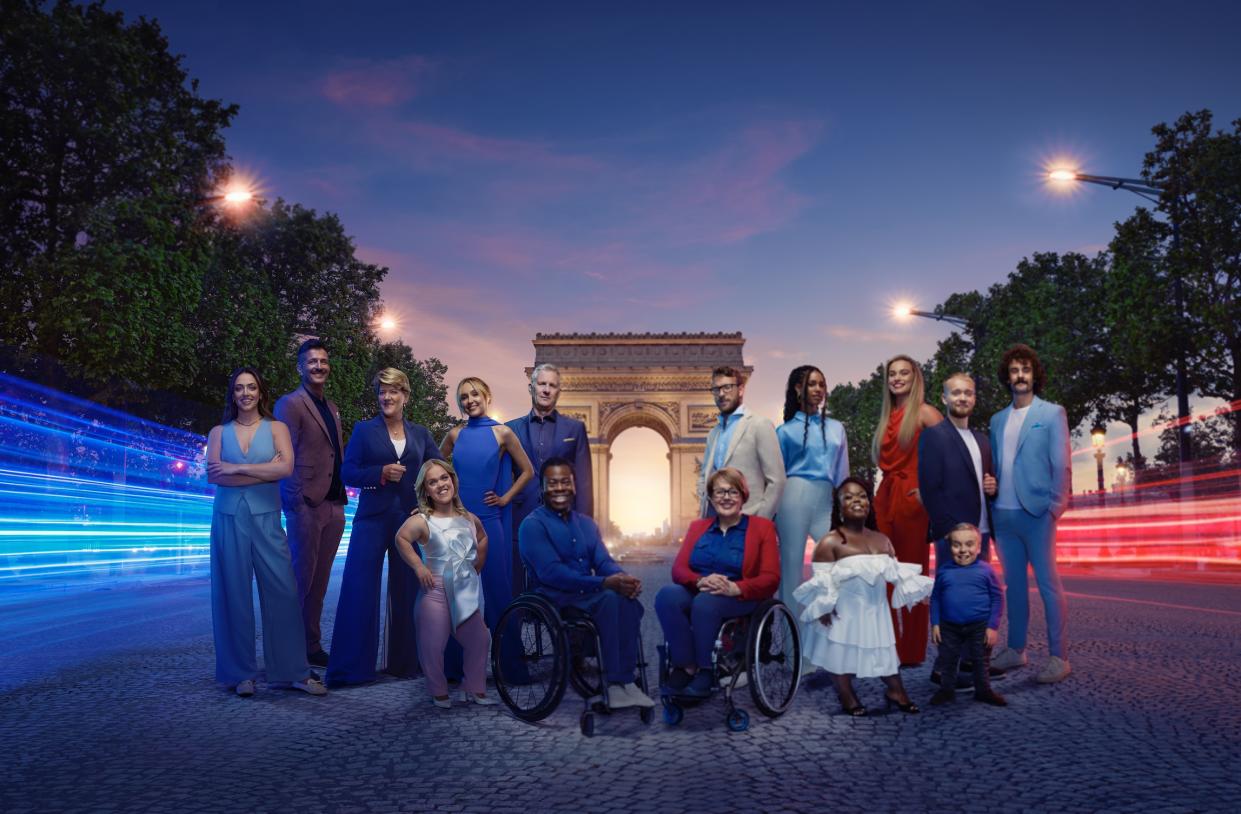
Staying positive
I was in hospital for two and a half months having a total of 25 surgeries. I focused on what I could, rather than what I couldn’t do – that really helped me. So, I was learning Spanish, I was reading, I was obviously busy recovering, making friends and also, when I left hospital I learned to DJ.
I also had therapy, because I felt so okay that I was worried I was just deflecting, but no, therapy confirmed I really was ok! Seven years on and I can say – no pun intended – that I took the amputation in my stride.
I didn’t realise how strong I was until my accident happened. I learned that it’s only by going though challenges that you build your resilience and self-belief, which is why I have set myself so many challenges since.
I focused on what I could, rather than what I couldn’t do – that really helped me.
After I came out of hospital, I was in a wheelchair for a month, then I got my prosthetic leg in the January.
They literally put a harness on me, gave me a walking stick, and I just walked... It was very strange at first. For example, going down hills is actually really difficult for amputees. You have a fixed gradient in your foot, so when you have no foot it's hard to control your leg.
Also, it can be very painful. This is because the amputated leg bashes against the prosthetic and can cause cuts. The first leg you get isn't always the best one, because your amputated leg changes shape for two years afterwards.
I practised hard, though and within a month, I’d gone back to my work placement at Chelsea Football Club and had started to train for the 100m.
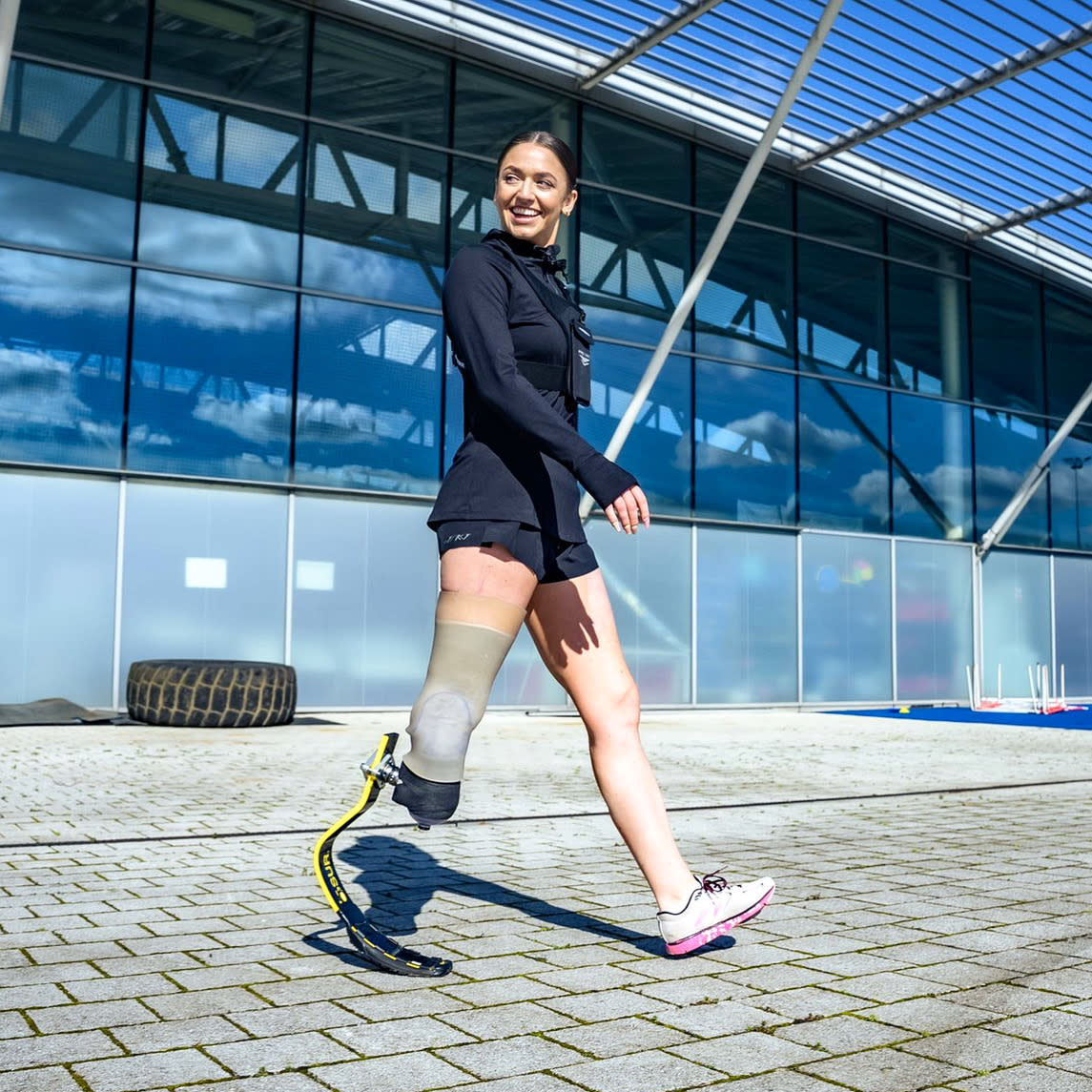
Blade runner
If I thought learning to walk with a leg was hard, learning to walk with a blade is so much harder. It feels so alien. The blade is unbelievably light and your hips aren't balanced, until you start to run when you have to push your hips into the blade to propel yourself forward, so that's why you can't walk with a running blade.
If I thought learning to walk with a leg was hard, learning to walk with a blade is so much harder.
But I always just viewed it as a fun challenge, like, I got to learn to run with two legs, now I get to learn to run with one! How many people in this life get to experience both?
Sharing my journey and what tools for resilience I have learned through my experience was a game-changer. Social media can be so supportive and I loved being able to help others at the same time as getting much-needed support myself.
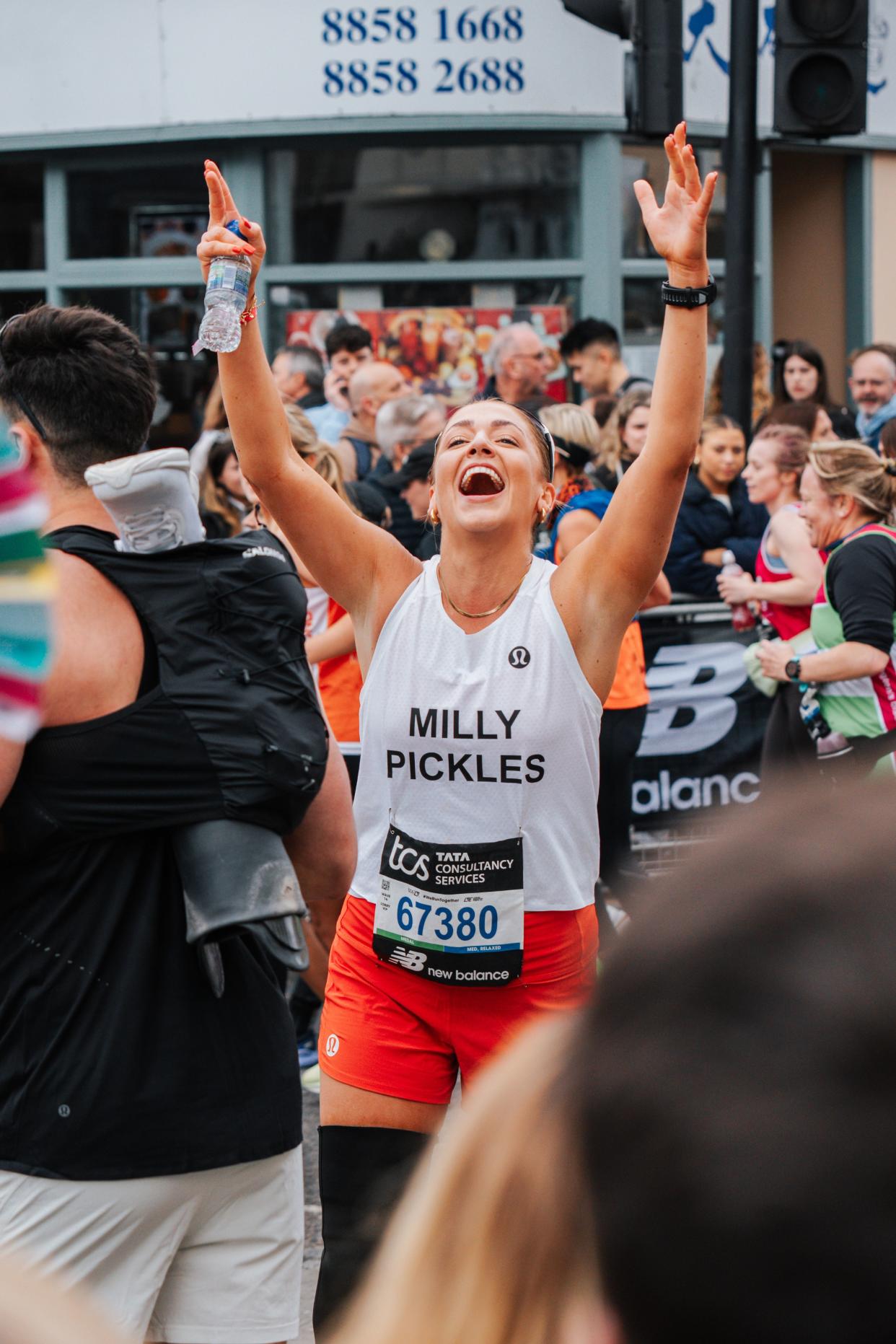
Since I learned to run on a blade, I’ve run the London Marathon and the RedBull 400 international competition. It’s amazing to have shared these experiences as a disabled person on a social media platform but I don’t see myself as just a disability advocate. I'm just trying to show every single person that we all have limitations, but if you put your mind to something, you can achieve it.
I'm trying to show every single person that we all have limitations, but if you put your mind to something, you can achieve it.
So, it’s about sharing an approach to life and also things that have helped me. For example, I believe that happiness is achievable for everyone, it’s just a matter of understanding certain tools and strategies.
Feeling grateful
For me, practising gratitude helps enormously. The more I am expressing gratitude, the more I’m looking for the positive in my life, and the more positive things happen.
Also, journalling is brilliant because it helps me understand why I feel a certain way and to identify my behaviours.
Journalling is brilliant because it helps me understand why I feel a certain way and to identify my behaviours.
Often the reason I think I'm sad is never the actual reason – there's a deeper-rooted issue. Once I identify that I can work on solutions.
I believe that where you are right now is the result of previous actions so, when you are struggling, think back to when you were happy. What were you doing around that time and how can you recreate it?
I started my running club Pickles Places because there's not much representation within the running community for disabled people.
Everyone's obsessed with certain paces and times, especially on social media, so just getting disabled people to feel confident enough to join a running club is hard enough. However, Pickles Places isn’t just for disabled people, because that doesn't represent true society to me. So it’s a place where everyone can enjoy running. I'm hoping to grow the clubs and do it monthly.
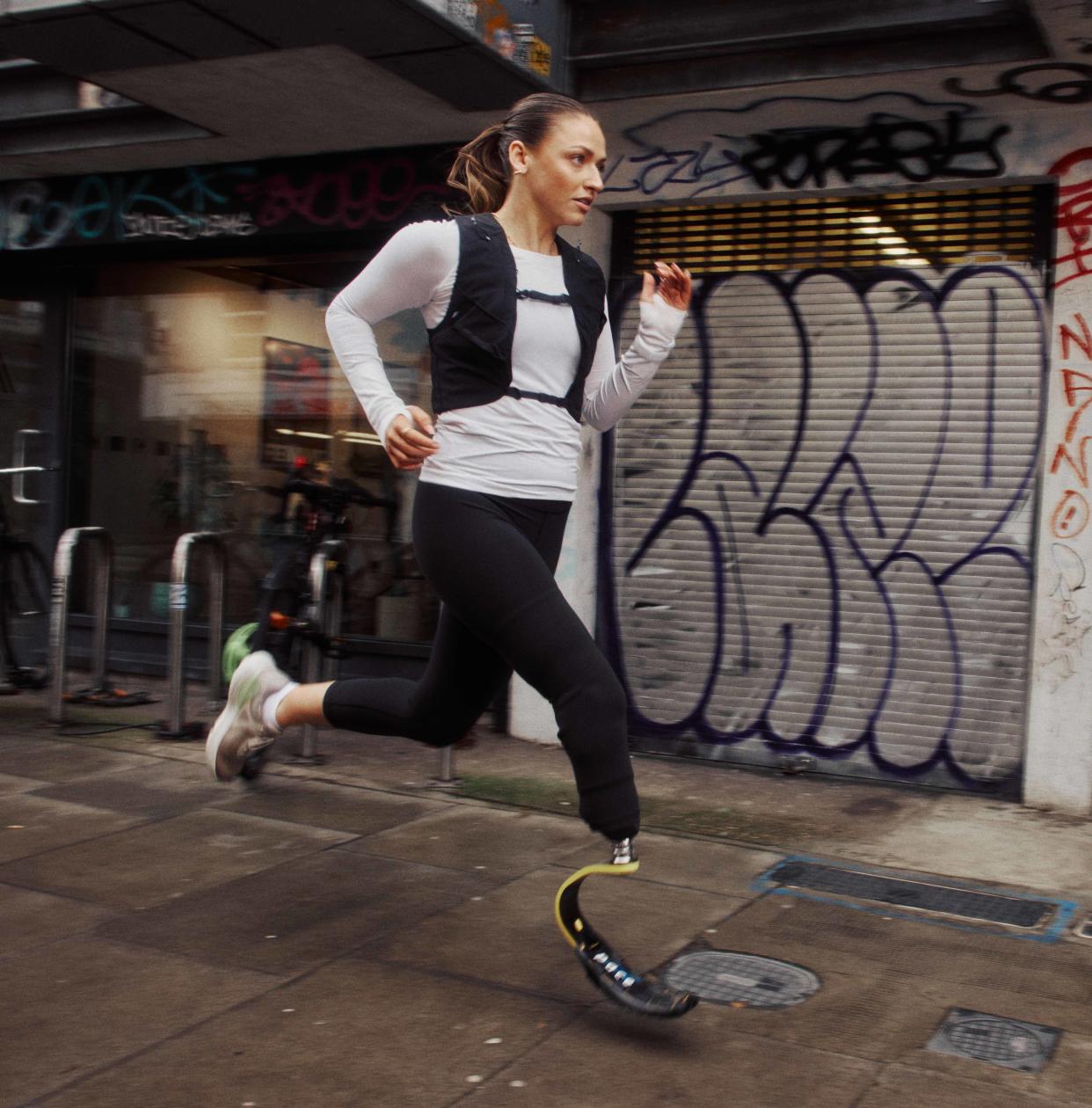
Navigating dark times
Obviously, with all the tools in the world, I still have dark times. One of the hardest times was in the February after I’d got my prosthetic leg in the January.
I'd gone through the 25 surgeries and nearly died. Then, I’d learned to walk and I was back at my work placement at Chelsea Football Club, thinking, 'Ok, life's different now, but I'm doing what I can.'
And then suddenly half my hair fell out due to trauma. I looked in the mirror – half my hair was missing, my leg was missing and I’d gained loads of weight with a binge-eating disorder and I felt like, 'When am I going to catch a break?'
Suddenly half my hair fell out due to trauma. I looked in the mirror – half my hair was missing, my leg was missing and I’d gained loads of weight with a binge-eating disorder and I felt like, 'When am I going to catch a break?'
But even then, I didn't view myself in a negative light, because I knew inside, I was still Milly, and if anything, my mindset had grown unbelievably despite all I’d been through and that made me proud.
Another time was last year when I couldn't walk on my prosthetic leg for three months. For the first two weeks, I was absolutely fine – I had a knee scooter. And then, suddenly, reality hit. I reaIised I can’t live on my own, I literally cannot walk. I can't take my bins down or get myself some milk, and I felt really low.
When you're disabled and already feeling challenged and then you go out into society and realise it’s not built for you, it's even more soul-destroying.
I didn’t leave the flat for two weeks, at which point, I was like, 'Right, I've sat with my emotions long enough, I now need to do something.' And so, I journalled, and I realised I wasn’t low because I couldn’t walk, but because I wasn’t living my life as I had been doing.
I needed to push myself out of my comfort zone, even if I didn’t want to, and so I started doing motivational speaking again. I always feel even more different without my leg on so meeting all those people was overwhelming but after doing it, I began to feel happy. Soon I forgot I couldn’t walk. And that all came from journalling!
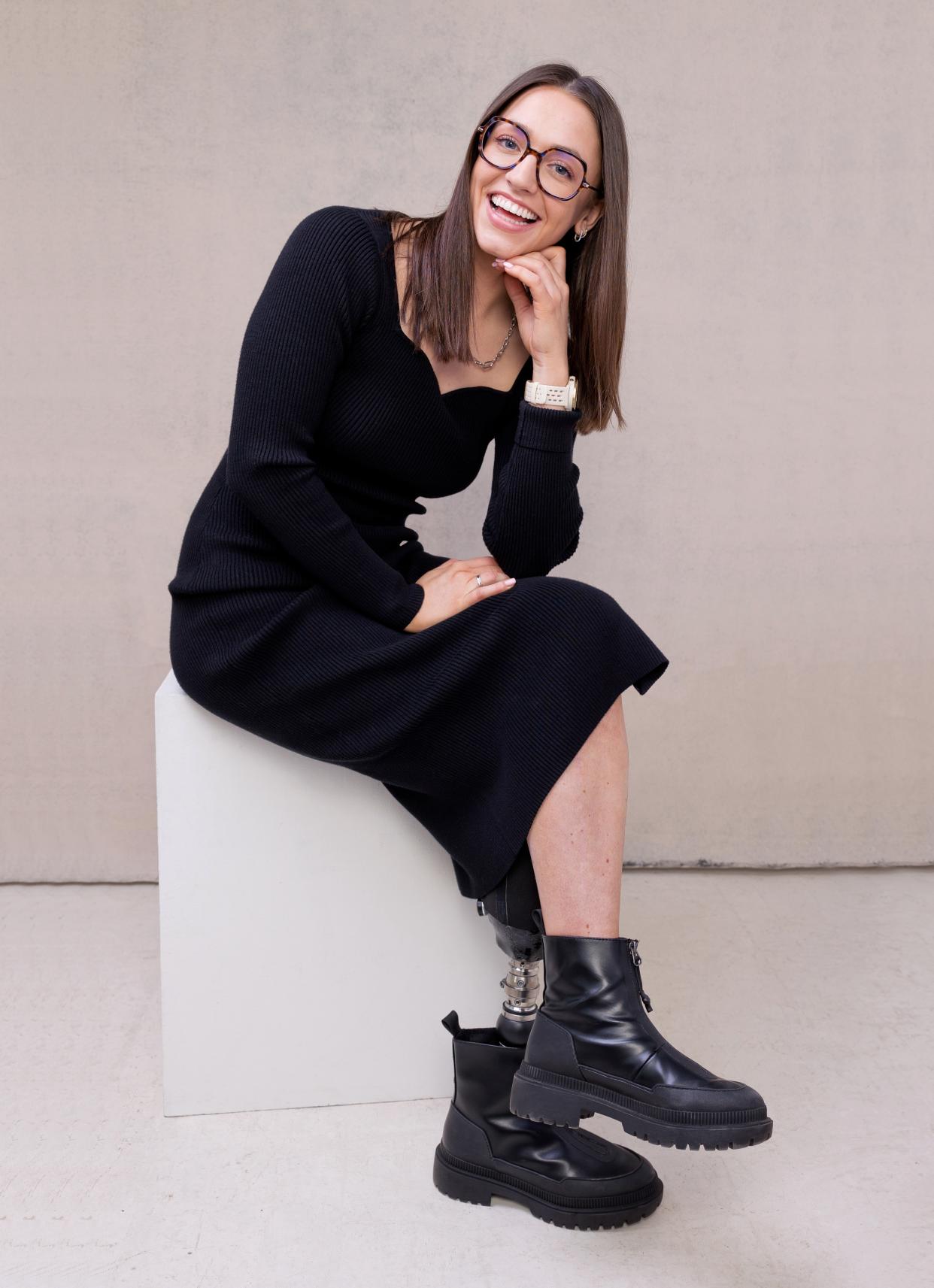
Inspiring others
To anyone who has recently become an amputee, I’d say this, I completely understand how right now it probably feels all encompassing... you may feel like, 'How can I live on?' But it will soon become a distant memory, and this will just be a part of your life. There is a new way of living and if I can find it, you can too.
The Paralympics gave me such hope for a future life when I first lost my leg.
Don’t compare your previous self to your current self and focus on what you can do every single day. Know you can reach out to anybody. Social media is huge.
If you want to do a sport, just always give something a go, never give up, take action, and you will get there.
The Paralympics gave me such hope for a future life when I first lost my leg. It has done so much to help disabled people, so to think I’m going to be able to raise awareness of disability on that incredible platform is such an honour. I just want to do the best possible job I can.
Watch or stream the Paris 2024 Paralympic Games on Channel 4 from Wednesday 28 August to Sunday 8 September.
For support and information, visit the Limbless Association, the largest charity for amputees in the UK, which empowers people to lead independent and fulfilling lives.
Read more
I lost my arm and leg after being run over by two tube trains (Yahoo Life UK, 8-min read)
TV star Joshua Patterson says running 'saved his life' (Yahoo Life UK, 8-min read)
Wim Hof: 'I don’t get scared of anything, my only fear is not being alive' (Yahoo Life UK, 5-min read)


